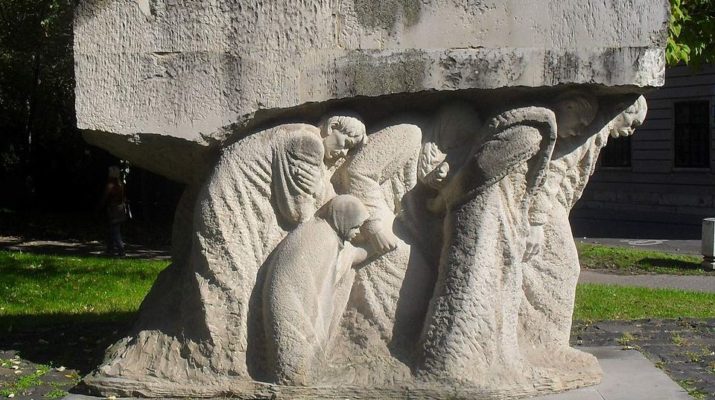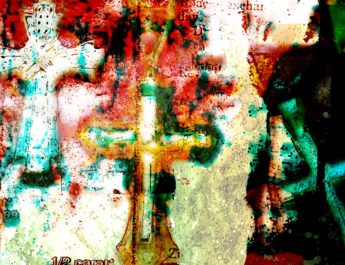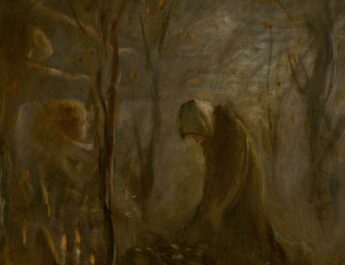Psalm 14
To the leader.A Of David.B
1 FoolsC say in their hearts,D “There is no God.”E
A “leader” = natsach. Properly, something that glitters from a distance. So, something that stands out, excels, has status/standing (such as a chief musician or superintendent of Temple services). This can also mean to be permanent or enduring.
B “David” = david. From the same as dod (beloved, love, uncle); the root may mean to boil, which is used figuratively to describe love. So, this implies someone you love such as a friend, a lover, or a close family member like an uncle. David’s name likely means something like “beloved one.”
C “fools” = nabal. 18x in OT. . From nabal (to be foolish, senseless, fall away, faint, wither, to be wicked, disgrace). This is foolish or a fool. It can also mean impious. Nabal, taken from this root, was the name of Abigail’s first husband in 1 Samuel 25.
D “hearts” = leb. May be related to labab (to encourage; properly, to be encased as with fat; used in a good sense, this means to transport someone with love; used in a bad sense, it can mean to dull one’s senses). This is the heart, courage, one’s inner self, the mind, or the will. Heart is only used in a figurative sense in the Old and New Testaments.
E “God” = Elohim.
They are corrupt,F they do abominableG deeds;H
there is no one who does good.I
F “are corrupt” = schachath. This is to decay, go to ruin in a literal or figurative sense. It could be to lose, mar, or spill, It can also be a corruptor or destroyer.
G “do abominable” = taab. From toebah (abomination, loathsome, something morally disgusting or abhorrent). This is to abhor, despise, to reject, to act abominably.
H “deeds” = alilah. From alal (to affect, do, practice, mock, overdo, glean, abuse, pain). This is a deed or action – something that causes an effect. It could be a wanton or shameful deed or an opportunity.
I “good” = tob. From tob (to be pleasing, to be good). This is good, beautiful, pleasant, agreeable, bountiful, at ease. This word is used for goodness as a concept, a good thing, a good person. This can refer to prosperity and welfare as well as joy, kindness, sweetness, and graciousness. So, this is ethically good, but also enjoyably good.
2 The LordJ looks downK from heavenL on humankindM
to see if there are any who are wise,N
who seekO after God.
J “Lord” = YHVH. From havah (to be, become) or hayah (to come to pass, become, be). This is the name of the God of Israel, the self-existent and eternal one, the tetragrammaton. This pronunciation has been lost to time so “Lord” is generally used in its place.
K “looks down” = shaqaph. This is to look down or look out. Properly, it is looking by leaning out a window. It can be peeping or gazing.
L “heaven” = shamayim. Root may mean being lofty. This is sky, the air, or heaven. It is in a dual noun form so this might refer to the part of the sky where the clouds move on the one hand and the part beyond that where the sun, moon, and stars are on the other hand.
M “humankind” = ben + adam. Literally “children of humanity.” Adam is perhaps from adam (to be red, make ruddy); related to adamah (ground, dirt, earth). This is man, humankind, also Adam’s name. It refers to a human individual or humanity.
N “are wise” = sakal. This is to consider or be prudent and so it can mean to instruct or be an expert. It can also mean dealing prudently, which implies success and prospering. This verb presumes intelligence of the subject. In one form of the verb, it can mean laying cross-wise.
O “seek” = darash. This is seek, ask, inquire, care for. Generally it means following in pursuit or following as part of a search, which implies seeking or asking. Also used specially to mean worship.
3 They have all gone astray,P they are all alike perverse;Q
there is no one who does good,
no, not one.
4 Have they no knowledge,R all the evildoersS
who eat up my peopleT as they eat bread,U
and do not callV upon the Lord?
P “gone astray” = sur. This is to turn aside in a literal or figurative sense – to depart, decline, rebel, remove, or withdraw.
Q “perverse” = alach. 3x in OT. This is to muddle, be filthy. Figuratively, it can be to become morally corrupt.
R “knowledge” = yada. This is to know, acknowledge, advise, answer, be aware, be acquainted with. Properly, this is to figure something out by seeing. It includes ideas of observation, recognition, and care about something. It can be used causatively for instruction, designation, and punishment.
S “evildoers” = paal + aven. Literally “doers of evil.” Paal is to do, make, work, or accomplish. Generally refers to regularly repeated or systematic action – so, to practice. Aven root may mean panting as one does when expending a lot of energy, especially when it comes to nothing. This is nothingness, trouble, sorrow, distress, wickedness, evil, harm, sorrow, misfortune, and mischief. It is also used specifically to refer to idols.
T “people” = am. From amam (to darken, hide, associate; creating shadows by huddling together). This is people or nation. It can be used specifically for a tribe, collectively of troops or armies, or figuratively to refer to a flock of animals.
U “bread” = lechem. From lacham (to eat, feed on). This is bread, food, loaf. It can refer to food more generally for people or for animals.
V “call” = qara. This is to call or call out – to call someone by name. Also used more broadly for calling forth.
5 There they shall be in greatW terror,X
for God is with the companyY of the righteous.Z
W “great” = pachad. Related to “be in…terror” in v5. From pachad (see note X below). This is dread, fear, panic, terror, sudden alarm, awe, disaster.
X “be in…terror” = pachad. To dread, be afraid, thrill, be in awe. This is properly feeling startled from a sudden sound or alarm and so, more generally, to be afraid.
Y “company” = dor. From dur (to move in a circle, which implies living somewhere or remaining there; it can also be the sense of piling or heaping up). This is a revolution of time, which is to say, an age or generation. It can also be a dwelling or one’s posterity.
Z “righteous” = tsaddiq. From the same as tsedeq (rightness, righteousness, just cause, vindication; that which is right in a natural, moral, or legal sense; abstractly equity; figuratively prosperity). This is just, innocent, righteous, righteous one, or lawful.
6 You would confoundAA the plansBB of the poor,CC
but the Lord is their refuge.DD
AA “confound” = bosh. Properly, this means to be pale, which implies shame, disappointment, or confusion.
BB “plans” = etsah. From yaats (to counsel, advise, determine). This is advice, purpose, plan, prudence, or counselor.
CC “poor” = ani. From anah (to be bowed down; humility or being browbeaten, oppressed, afflicted, or depressed; literal or figurative – depressed in mood or circumstance). This is humble, lowly, poor, or afflicted.
DD “refuge” = machaseh. From chasah (to take refuge or flee for protection; figuratively, to hope or trust in someone or something). This is a shelter in a literal or figurative sense. It is refuge or place of refuge. It could also be hope or trust.
7 O that deliveranceEE for IsraelFF would come from Zion!GG
EE “deliverance” = yeshuah. From yasha (to deliver, defend, help, preserve, rescue, be safe. Properly, to be open, wide or free, which implies being safe. Used causatively, it means to free). This is salvation, deliverance, health, victory, prosperity.
FF “Israel” = yisrael. From sarah (to persist, exert oneself, contend, persevere, wrestle, prevail) + el (God or god). This is God strives or one who strives with God; new name for Jacob and for his offspring. This refers to the people and to the land.
GG “Zion” = tsiyyon. The word is related to tsyiyyun (signpost, monument); from tsavah (to charge someone, to command, order); from the same as tsiyyah (dryness drought); from a root meaning parched as desert, dry land. Zion can refer to a mountain in Jerusalem as well as another name for Jerusalem itself or the people.
When the Lord restoresHH the fortunesII of his people,
JacobJJ will rejoice;KK Israel will be glad.LL
HH “restores” = shub. To turn back, return, turn away – literally or figuratively. Doesn’t necessarily imply going back to where you started from. This is also the root verb for the Hebrew word for repentance “teshubah.”
II “fortunes” = shebuth. From shabah (to take captive, keep, a captor). This is prisoners or exile. It can also be used figuratively to describe a previous condition of prosperity.
JJ “Jacob” = yaaqob. From the same as aqeb (heel, hind part, hoof, rear guard of an army, one who lies in wait, usurper). This is Isaac’s son and his descendants. The name means heel-catcher or supplanter.
KK “rejoice” = gil. Properly, this is twirling around because of a strong feeling whether of rejoicing or from fear. This can be rejoice, be glad or joyful, or to cry.
LL “be glad” = samach. This is to rejoice or be glad. Properly, it is to brighten up in a literal or figurative sense.
Image credit: “Memorial to the Persecuted – Bearing a Heavy Weight Together” by Péter Gáspár in Komarno, Slovakia, 1999.




